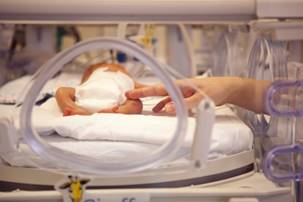Children and Youth with Special Health Needs (CYSHN)
Programs
- Birth Defects Monitoring and Analysis
- Early Hearing Detection and Intervention
- Follow Along Program
- Longitudinal Follow-up for Newborn Screening Conditions
Related Sites
Contact Info
Birth Conditions in Minnesota
 The Birth Defects Program at the Minnesota Department of Health collects information about around 60 conditions present at birth. About 2,000 babies are born with these congenital conditions, generally known as “birth defects”, in Minnesota every year. These conditions develop for different reasons and many causes are not understood. Below, you will find information about the most common of these birth conditions as well as the most frequent risk factors for these conditions.
The Birth Defects Program at the Minnesota Department of Health collects information about around 60 conditions present at birth. About 2,000 babies are born with these congenital conditions, generally known as “birth defects”, in Minnesota every year. These conditions develop for different reasons and many causes are not understood. Below, you will find information about the most common of these birth conditions as well as the most frequent risk factors for these conditions.
- Top 10 Birth Conditions in Minnesota
- Most Common Risk Factors for Birth Conditions
- Birth Conditions Prevention
Top birth conditions in Minnesota, 2012-2016
The Birth Defects Program at the Minnesota Department of Health tracks over 60 birth conditions, including some that are not tracked by the Centers for Disease Control and Prevention. For the birth conditions we track, the top 10 conditions are:
| Rank | Birth condition | Total number of babies born with the condition from 2012-2016 | Number of babies per 10,000 births |
|---|---|---|---|
| 1 | Hypospadias (males only) | 432 | 69.9 |
| 2 | Ventricular septal defect | 815 | 67.1 |
| 3 | Atrial septal defect | 256 | 21.1 |
| 4 | Down syndrome | 210 | 17.3 |
| 5 | Pulmonary valve atresia and stenosis | 147 | 12.1 |
| 6 | Cleft palate | 70 | 5.8 |
| 6 | Cleft lip with cleft palate | 70 | 5.8 |
| 8 | Atrioventricular septal defect | 68 | 5.6 |
| 9 | Coarctation of the aorta | 66 | 5.4 |
| 10 | Renal agenesis and hypoplasia | 63 | 5.2 |

Top birth conditions in Minnesota, 2012-2016, by maternal race/ethnicity (PDF) - The top birth conditions in Minnesota vary by race and ethnicity. This document breaks down the top birth conditions for the following communities: White, non-Hispanic; Black, non-Hispanic; Hispanic; Asian and Pacific Islander, non-Hispanic; and American Indian and Alaska Native, non-Hispanic.
To explore the data available on birth conditions in Minnesota, visit the Minnesota Public Health Data Access for Birth Defects .
Common risk factors for birth conditions
Though genetics may lead to babies to being born with some birth conditions, many other factors can increase the risk of a baby being born with a birth condition. Some of these risk factors are not preventable, but there may be ways to reduce the risk. Some common risk factors for birth conditions include:
- Diabetes
- Obesity
- Hypothyroidism
- Iodide deficiency
- Mother with phenylketonuria
- Myasthenia gravis
- Systemic lupus erythematosus
- Vitamin A deficiency
- Vitamin K deficiency
- Hypoxia
- Heroine or methadone
- Alcohol
- Cocaine
- Smoking tobacco
- Marijuana
- Toluene (glue sniffing)
- Lead
- Mercury
- Carbon monoxide poisoning
- Gasoline fumes
- Magnesium sulfate
- Methyl isocyanate
- Methylene blue
- Phthalates
- Polychlorinated biphenyls
- Cancer therapy
- Aminopterin or amethopterin
- Androgenic hormones
- Angiotensin converting
- Enzyme (ACE) inhibitors
- Busulfan
- Carbamazepine
- Cyclophosphamide
- Cyclosporin
- Diethylstilbestrol
- Efavirenz
- Etretinate
- Fluconazole
- Iodide
- Isotretinoin (13-cis-retinoic acid)
- Lamotrigine
- Lithium
- Methimazole or Carbimazole
- Mycophenolate mofetil
- Paroxetine
- Phenobarbital
- Phenytoin
- Propylthiouracil
- Prostaglandin E1 (misoprostol)
- Tetracycline
- Thalidomide
- Trimethadione or paramethadione
- Valproic acid
- Warfarin
- Cytomegalovirus
- Herpes simplex
- Parvovirus
- Rubella
- Syphilis
- Toxoplasmosis
- Varicella
- Venezuelan equine encephalitis virus
- West Nile virus
- Zika virus
- Chorionic villus sampling (CVS)
- Intracytoplasmic sperm injection (ICSI)
- Trauma to placenta
Birth Conditions Prevention
For information about ways to prevent birth conditions, visit the CDC Birth Defects Prevention Website.
MDH funds community partners' programs that aim to prevent babies being born with birth conditions. To learn more, visit the Preconception Health in Minnesota Grant webpage.